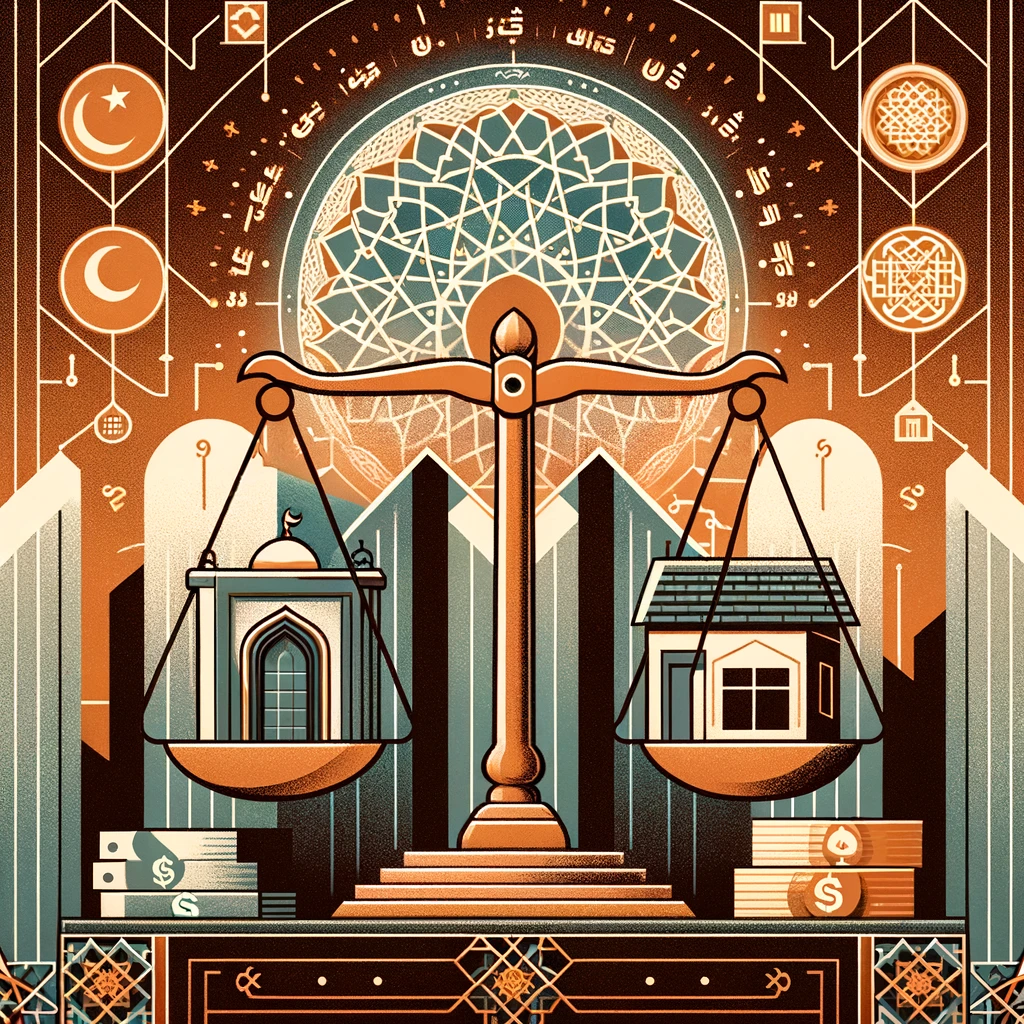Financing with Faith: How Halal Mortgages Differ from Traditional Loans
In today's diverse financial marketplace, the choice between halal and conventional mortgages is more than just a decision about interest rates—it's a matter of faith, ethics, and personal values. For many Muslim homebuyers, adhering to Islamic financial principles is paramount, making halal mortgages an essential tool for achieving homeownership without compromising their beliefs. Unlike conventional mortgages that thrive on interest—a concept prohibited in Islam—halal financing offers a Sharia-compliant pathway to buying a home, emphasizing profit-sharing and ethical investments.
This article aims to demystify the complex world of halal and conventional mortgages, presenting an in-depth comparison to help potential homebuyers navigate their choices. By understanding the unique structure of halal mortgages, including profit rates and Islamic contracts like Murabaha and Ijara, individuals can appreciate the ethical, financial, and social benefits these mortgages offer. We'll explore how halal mortgages align with Islamic principles, providing a transparent and fair financing solution, and compare them to the more traditional loan options available in the market. Whether you're deeply invested in living by Islamic financial principles or simply curious about ethical financing alternatives, this guide will illuminate the path towards making an informed decision that aligns with your personal values and financial goals.

Introduction to Halal Financing
Halal financing is not just an alternative financial solution; it's a comprehensive approach that intertwines faith with finance, ensuring that all monetary transactions adhere to Islamic law. At its core, halal financing, including mortgages, operates on the principle of risk-sharing, asset-based financing, and the prohibition of Riba (interest), Gharar (uncertainty), and Maysir (gambling). This ethical framework ensures that financial products not only comply with Islamic law but also promote fairness, transparency, and social welfare.
Unlike conventional mortgages that are interest-based, halal mortgages use various contracts to facilitate the purchase of a home without the exchange of interest. These contracts are designed to comply with Islamic principles, offering a mutually beneficial arrangement between the buyer and the financial institution. By focusing on asset-based transactions, halal financing ensures that money is not made from money, but from tangible assets and real economic activity. This approach not only aligns with Islamic law but also introduces a level of stability and ethical consideration into the financial system that is often absent in conventional frameworks.
Conventional mortgages, on the other hand, are structured around the lending of money at interest, where the lender profits from the interest rate charged on the loan. This system, while widely accepted in many parts of the world, diverges significantly from the principles of halal financing by creating money from money, a concept that can lead to financial instability and inequality.
The difference between these two approaches to mortgages is profound, reflecting divergent views on the role of finance in society. Where conventional mortgages prioritize profit through interest, halal mortgages emphasize ethical investment, risk-sharing, and contributing to societal welfare. This foundational difference highlights the importance of understanding both systems to make informed decisions that align with one's faith and financial goals.
The Structure of Halal Mortgages
Halal mortgages distinguish themselves through a unique structure that aligns with Islamic law, offering a Sharia-compliant path to homeownership. This structure fundamentally differs from conventional mortgages by avoiding the payment or receipt of interest (Riba), which is prohibited in Islam. Instead, Islamic banks and financial institutions employ various contract models to facilitate the purchase of a home in a manner that complies with Sharia principles. The two most common types of contracts used in halal financing are Murabaha and Ijara.
Murabaha involves the financial institution purchasing the property and then selling it to the buyer at a profit, rather than lending money at an interest rate. The price is agreed upon in advance, including the profit margin of the bank, which is clear and transparent. Payments are made in installments until the full price is settled, allowing the buyer to avoid interest. This method is asset-based, linking the transaction to a tangible asset, which enhances financial stability and ensures adherence to Islamic ethical standards.
Ijara, on the other hand, is akin to leasing. The financial institution buys the property and leases it to the buyer for a specified period. During this time, the buyer pays rent, which includes a portion that contributes to purchasing the property outright. At the end of the lease term, the title of the property transfers to the buyer, completing the home purchase without the exchange of interest.
These structures provide several benefits, including risk-sharing between the buyer and the financial institution, promoting ethical investing, and ensuring transactions are backed by tangible assets. Unlike conventional mortgages, where the lender's profit is tied to the interest rate and can lead to financial instability, halal mortgages are designed to create a more equitable financial system. They encourage investments in real economic activities, contributing to a more stable and ethical economy.
By focusing on these Sharia-compliant methods, halal mortgages offer a viable alternative for Muslim buyers seeking to avoid interest. This adherence to Islamic principles does not mean sacrificing financial benefits; instead, it presents a model of financing that is ethical, transparent, and potentially more stable in the long term.
Benefits of Halal Mortgages
Choosing a halal mortgage is not merely a financial decision; it's a reflection of one's ethical values and commitment to fair economic practices. Halal mortgages offer several benefits that go beyond the financial aspects, aligning with the principles of Islamic finance to create a more just and equitable system.
Ethical Financing
At the heart of halal mortgages is the principle of ethical financing. These mortgages ensure that all financial transactions are conducted in a manner that is fair, transparent, and beneficial to all parties involved. Unlike conventional mortgages, which can often involve hidden fees and complex interest structures that contribute to economic inequality, halal mortgages are based on clear, straightforward agreements. By focusing on asset-based transactions and profit-sharing, they promote risk-sharing and discourage speculative financial practices.
Financial Benefits
Halal mortgages offer significant financial benefits. By avoiding the payment of interest, which can often add a considerable burden over the lifetime of a conventional mortgage, buyers potentially save a substantial amount of money. Additionally, the structures of Murabaha and Ijara provide stability in payments, shielding buyers from the volatility of interest rates and market fluctuations. This stability can be particularly advantageous in times of economic uncertainty, offering peace of mind to homeowners.
Social and Community Advantages
Halal mortgages also have a positive impact on the broader community. By adhering to Islamic financial principles, these mortgages contribute to a financial system that emphasizes equity, justice, and the welfare of the community. They encourage the flow of money into real economic activities, supporting business growth and community development. Furthermore, the ethical foundation of halal mortgages promotes a sense of responsibility and integrity among financial institutions, leading to healthier communities and economies.
Aligning With Islamic Principles
For Muslim buyers, one of the most significant benefits of choosing a halal mortgage is the alignment with Islamic principles. Observing the prohibitions against Riba, Gharar, and Maysir, halal mortgages ensure that one's financial dealings are in harmony with their faith. This alignment brings not only financial peace but also spiritual contentment, knowing that one's home is financed in a manner that upholds their religious values.
Accessibility and Inclusivity
Finally, the growing availability of halal mortgages has made homeownership more accessible to Muslims around the world, providing a viable alternative to conventional financing. This inclusivity ensures that more individuals can own homes without compromising their beliefs, contributing to the diversity and resilience of the housing market.
Comparing Halal and Conventional Mortgages: Pros and Cons
When considering the purchase of a home, many buyers are faced with the decision between halal and conventional mortgages. This choice is not merely about financial calculations but also involves ethical considerations, personal beliefs, and long-term implications. Here, we compare the two, highlighting their advantages and disadvantages to help buyers make an informed decision.

Advantages of Halal Mortgages
- Ethical Financing: Halal mortgages provide a way to finance a home without compromising Islamic principles, avoiding interest, and promoting risk-sharing.
- Financial Stability: The fixed payments in halal financing offer protection against fluctuating interest rates, providing a more predictable financial future.
- Community and Social Welfare: Investments in halal mortgages support ethical, asset-backed economic activities, promoting community development and social justice.
Disadvantages of Halal Mortgages
- Limited Availability: Halal mortgages are not as widely available as conventional mortgages, which can limit options for buyers.
- Higher Initial Costs: Due to the structure of some halal financing models, the initial costs may be higher than those of conventional mortgages.
- Misconceptions: Lack of understanding about halal mortgages can lead to misconceptions, hindering their acceptance and availability.

Advantages of Conventional Mortgages
- Widespread Availability: Conventional mortgages are readily available, offering a wide range of options for buyers.
- Competitive Interest Rates: Buyers can benefit from competitive interest rates, especially in favorable economic climates.
- Flexibility: Conventional mortgages often come with various options for terms, rates, and refinancing, providing flexibility to suit different financial situations.
Disadvantages of Conventional Mortgages
- Interest-based: The reliance on interest conflicts with Islamic principles, making conventional mortgages unsuitable for those wishing to adhere to Sharia law.
- Economic Volatility: Interest rates on conventional mortgages can fluctuate, impacting monthly payments and overall affordability.
- Ethical Considerations: Conventional mortgages do not necessarily adhere to ethical or socially responsible financing practices, which may be important to some buyers.
Making the Right Choice
The decision between a halal and conventional mortgage depends on individual circumstances, beliefs, and priorities. For those committed to Islamic finance principles, halal mortgages offer a way to buy a home that aligns with their faith. However, the practical considerations of availability, cost, and financial planning also play crucial roles. Buyers should carefully consider the long-term implications of their choice, seeking advice from financial experts and community leaders to navigate this important decision.

Choosing the Right Mortgage for You
Making the decision between a halal and conventional mortgage is a significant milestone in the journey towards homeownership. It's a choice that involves financial, ethical, and personal considerations. As we've explored the structures, benefits, and differences between halal and conventional mortgages, it's clear that the best choice varies from individual to individual, depending on their circumstances, beliefs, and priorities. Here are some final tips to guide you in making the decision that's right for you.
Assess Your Financial Situation
Begin by thoroughly evaluating your financial health. Consider your income, expenses, savings, and financial goals. Understanding your financial capacity will help you determine which mortgage type is more feasible and sustainable for your situation.
Consider Your Ethical and Religious Values
For many, the decision between halal and conventional mortgages goes beyond financial considerations and deeply ties into their ethical and religious beliefs. Reflect on how important it is for your financial transactions to align with Islamic principles or whether you prioritize the flexibility and availability of conventional mortgages.

Research and Compare Options
Take the time to research and compare different mortgage options available to you. Look into the details of each product, including the terms, rates, and any additional fees. Don't hesitate to reach out to financial advisors or institutions for clarity on any questions you may have.
Understand the Long-term Implications
Consider the long-term implications of your mortgage choice, including how it will affect your financial stability, investment portfolio, and overall lifestyle. Remember, a mortgage is a long-term commitment that will be part of your life for many years to come.
Seek Advice
Finally, seek advice from trusted financial advisors, family members, or community leaders who have experience in home buying. Their insights can provide valuable perspectives that help inform your decision.
Choosing the right mortgage is a critical step towards achieving homeownership and financial stability. Whether you opt for a halal mortgage that aligns with your faith or a conventional mortgage that offers certain financial advantages, the key is to make an informed decision that supports your long-term goals and values.

Our Conclusion on Halal Mortgages vs Traditional Mortgages
Embarking on the journey of homeownership is a significant milestone that encompasses more than just the financial aspect—it's a profound decision that impacts one’s lifestyle, values, and future. For Muslim buyers, the choice between halal and conventional mortgages is particularly poignant, offering a path that aligns financial goals with ethical and religious convictions. As we've explored, halal mortgages present a viable, Sharia-compliant alternative to conventional financing, promoting ethical investment, financial stability, and community welfare.
Yet, the decision-making process doesn't end at choosing the type of mortgage. It extends into a broader consideration of one’s financial health, ethical values, and long-term goals. By carefully evaluating these factors and seeking knowledgeable advice, prospective homeowners can navigate the complexities of mortgage financing with confidence. Whether through halal or conventional means, the goal remains the same: to secure a home that offers safety, stability, and a sense of belonging.
As the financial landscape continues to evolve, so too does the accessibility and understanding of Islamic finance. It’s a hopeful trend that promises more inclusive options for Muslim buyers and a broader recognition of the importance of ethical financing. "Financing with Faith: How Halal Mortgages Differ from Traditional Loans" not only sheds light on these options but also underscores the importance of making informed, value-driven decisions in one of life’s most significant investments.





